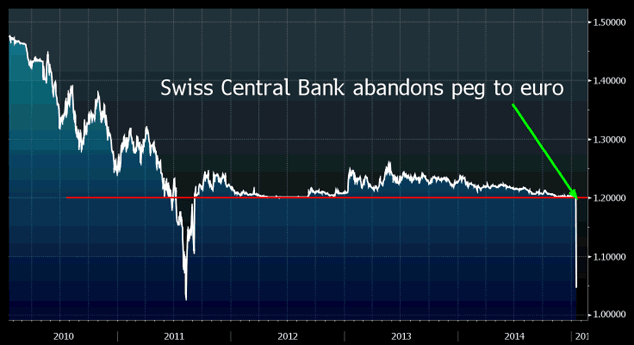
The forex markets are in chaos this morning, and it’s all down to the Swiss central bank.
Here’s what happened – the value of the euro has plunged against the Swiss franc. The chart below shows the number of Swiss francs a single euro will buy you. It’s gone from around 1.20 to roughly one. That’s a massive, epochal move in terms of foreign exchange markets – and it’s happened in a single morning.
Source: Bloomberg
The back story: why the Swiss fixed their exchange rate against the euro
Why? Here’s a bit of history for context. Back in September 2011, at the peak of the eurozone crisis, the Swiss National Bank (SNB) got very worried.
Terrified investors and savers in the eurozone were piling into what they saw as the safety of Swiss francs. That was driving up the value of the Swiss franc. At one point in 2011, it got to the point where the Swiss franc had dropped from 1.30 francs to the euro to near parity with the euro – in other words, one euro got you just one Swiss franc. (You can see that in the chart above – the spike crash in mid-2011).
That was bad for the country’s exporters and was inflicting deflation on the Swiss economy.
So the Swiss introduced a currency ‘ceiling’. The Bank wouldn’t allow the euro to weaken below 1.20 francs to the euro.
Now, you can’t just ‘set’ an exchange rate like that. If you don’t want your currency to strengthen, you have to back it up with action. So in order to keep the Swiss franc (CHF for currency traders) at 1.20 to the euro or weaker, the SNB had to sell a pile of Swiss francs.
The big news today: the Swiss scrap the cap
This morning, entirely out of the blue, the SNB announced it was scrapping that ceiling – it would no longer defend the 1.20 minimum exchange rate. The likely explanation is that it was simply too difficult to keep defending that level.
Just as George Soros and co. ‘broke’ the Bank of England in 1992, a similar thing has happened here – only in the other direction. It’s just become too painful for the SNB to keep pumping out francs.
Immediately, the Swiss franc rocketed to a record high against the euro at one point this morning – in fact just after the announcement, one euro would have briefly bought you a mere €0.85. And even at the time of writing, CHF is pretty much at parity with the euro. It’s also got a lot stronger against the dollar.
The SNB also started charging banks more to hold money with it (the Swiss interest rate has turned negative to -0.75%). But that didn’t hold back the franc in any obvious way.
What are the consequences?
So far, as a result, Swiss stocks have plunged. As Capital Economics point out, Switzerland “has typically sent nearly half of its exports to the eurozone and about 10% to the US.” So a strengthening currency – particularly against the euro – is not good news for them.
And the fall-out is likely to have an impact in many other areas. As Paul Lambert of Insight Investment points out to the Wall Street Journal: “The Swiss franc is a major currency, we’re not talking about a rarely-traded third-tier currency here.” For example, gold has soared this morning as investors rush to protect themselves against potential blow-ups in the financial system elsewhere.
The surprise move also suggests that the European Central Bank may be about to surprise markets with a big package of quantitative easing (QE) on Thursday coming. A big QE package would hammer the euro and have sent even more money fleeing into the Swiss franc. The SNB may have decided to give up the fight in advance of such a move.